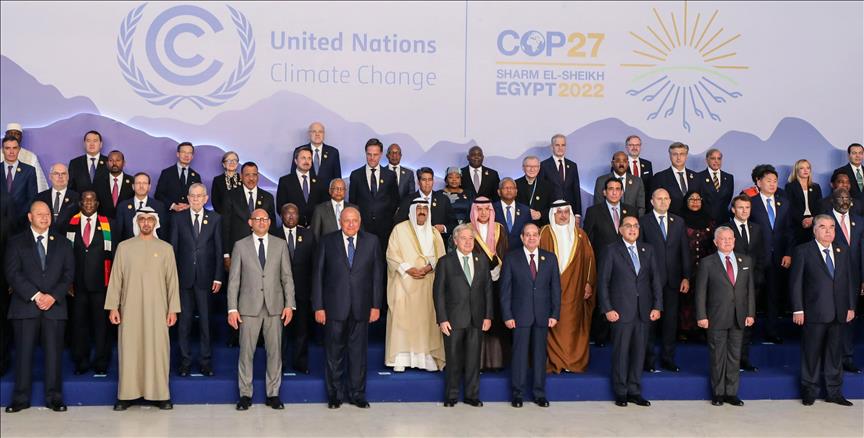The Executive Action Plan for Early Warnings for All, unveiled Monday at the United Nations (UN) climate summit, aims to reach everyone on Earth with early warnings against increasingly extreme and dangerous weather with an initial five-year investment of $3.1 billion, or just $0.50 per person per year for the next five years.
UN Secretary General Antonio Guterres announced the plan at a meeting of government and UN organization leaders, financing agencies, big tech companies, and the private sector.
The meeting was held during the World Leaders Summit at the 27th Conference of Parties to the UN Framework Convention on Climate Change (COP27) that runs from Nov. 6 to 18 in Egypt’s coastal city of Sharm El-Sheikh, while the World Leaders Summit will be held between Nov. 7 and 8.
The plan requires an initial estimated investment of $3.1 billion from 2023 to 2027, the benefits of which are expected to be far-reaching.
The initial investment amount corresponds to 6% of the requested $50 billion to cover the four Multi-Hazard Early Warning System pillars of disaster risk knowledge, observations and forecasting, preparedness and response, and communication of early warnings.
About $374 million of the investment is planned for disaster risk knowledge, which aims at systematically collecting data and undertaking risk assessments on hazards and vulnerabilities.
The $1.18 billion for observations and forecasting will be used to monitor hazards and develop early warning systems.
Lastly, the $550 million for dissemination and communication will enable communicating risk information so that it reaches all those who need it.
-Need for early warning systems urgent as number of disasters on rise
The need for early warning systems is evident with the increase in calamities that is not only costing lives but hundreds of billions of dollars in loss and damage, Guterres said at the launch of the plan.
He warned that ‘ever-rising greenhouse gas emissions are supercharging extreme weather events across the planet. Three times more people are displaced by climate disasters than by war. Half of humanity is already in the danger zone.’
The need for early warning systems is urgent as the number of recorded disasters has increased, owing in part to human-caused climate change and more extreme weather, according to a UN statement on the plan.
‘We must invest equally in adaptation and resilience. That includes the information that allows us to anticipate storms, heatwaves, floods and droughts. To that end, I have called for every person on Earth to be protected by early warning systems within five years, with the priority to support the most vulnerable first,’ Guterres said.
– 24-hours notice can cut damage by 30%
UN data reveals that half of the countries globally do not have early warning systems and even fewer have regulatory frameworks to link early warnings to emergency plans. The data also showed that the coverage is worst for developing countries on the front lines of climate change.
‘Early warnings save lives and provide vast economic benefits. Just 24 hours notice of an impending hazardous event can cut the ensuing damage by 30%,’ said World Meteorological Organization (WMO) Secretary-General Petteri Taalas.
Spending $800 million on such systems in developing countries would avoid losses of $3 to $16 billion, according to the Global Commission on Adaptation.
‘Such progress is only possible with modern science, sustained systematic observing networks, daily international exchange of quality data, access to high-quality early warning products, the translation of forecasts into impacts, plus advances in telecommunications,’ Taalas said.
-60% of people not covered by early warning systems
The essential ingredients to achieve Early Warnings for All include a deeper understanding of risk across all time scales, stronger national meteorological and hydrological services, disaster risk management agencies and emergency preparedness measures, accessible financial and technical support and an anticipatory humanitarian sector.
Sameh Hassan Shoukry, the Egyptian minister of Foreign Affairs and COP27 president, said that science clearly shows the urgency with which the world must act to assist those in need of support to adapt to the negative impacts of climate change.
‘The launch of this Executive Action Plan is an important contribution for adaptation and resilience, particularly in Africa, where 60% of people are not covered by early warning systems,’ he noted.
Addressing the event, Brad Smith, the vice chair and president of Microsoft, said the UN initiative would save lives by enabling people to adapt to climate change and respond to early warnings before disaster strikes.
The UN Secretary General will establish an Early Warnings for All Governing Board to ensure progress and continued strategic alignment of activities with implementing bodies. The board will be co-chaired by the executive directors of the World Meteorological Organization and the United Nations Office for Disaster Risk Reduction.

